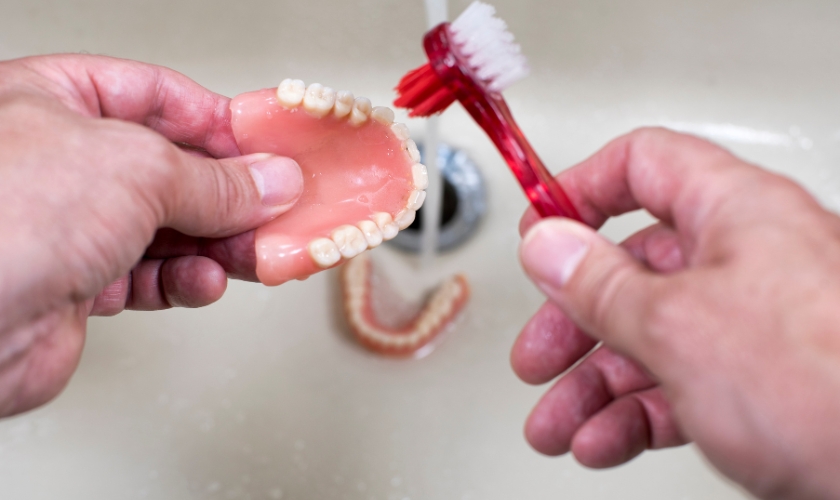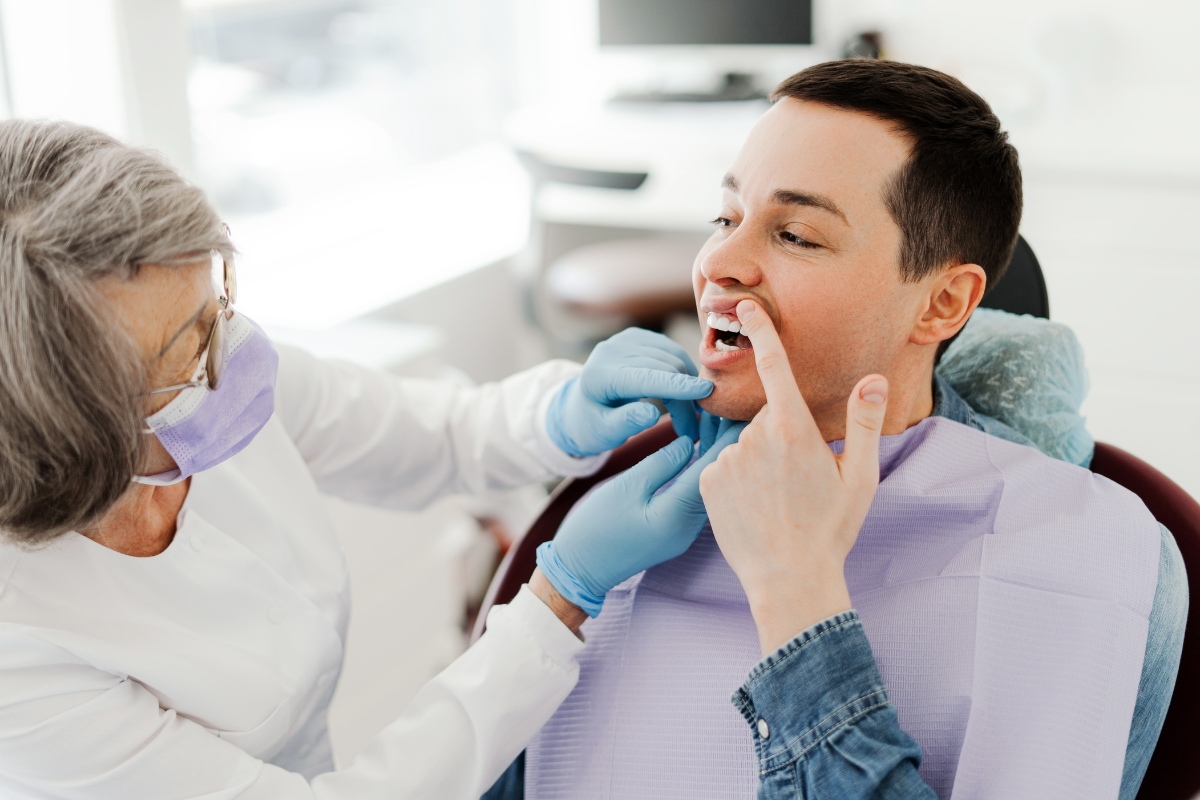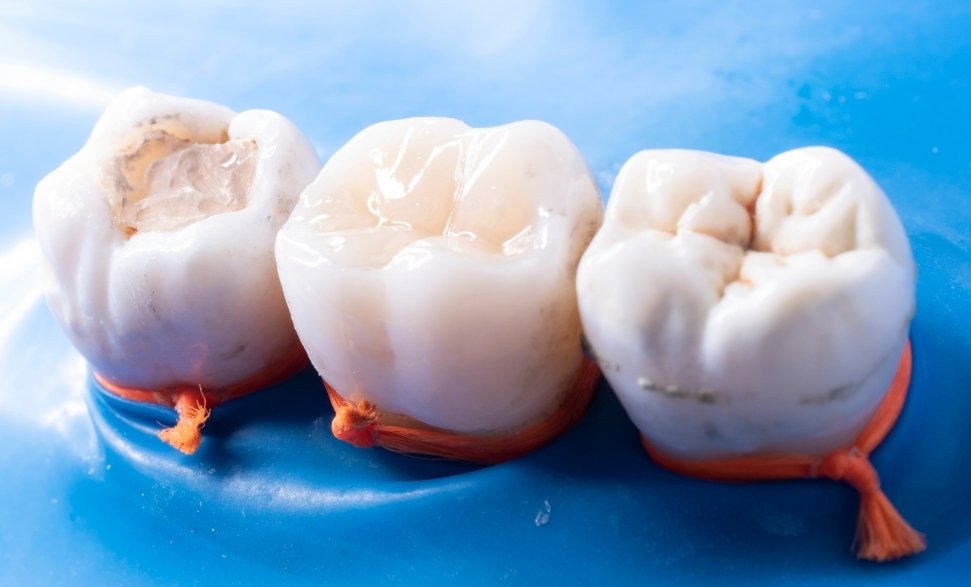
If you’re rocking a new set of dentures, congrats on stepping up your smile game! But let’s be real—sometimes, those shiny new teeth can come with a few unexpected surprises. One of the most common hiccups? Denture sore spots. These pesky, painful patches can definitely put a damper on your denture experience. Don’t worry, though! We’ve got the lowdown on what causes them and how to kick them to the curb—fast.
What Are Denture Sore Spots?
Denture sore spots are tender areas that show up in your mouth where your dentures rub against your gums. They can range from a mild irritation to full-blown painful sores, making eating, talking, and even smiling a real challenge. Think of them as your mouth’s way of saying, “Hey, something’s not right here!” Whether you’ve got a brand new set or have been wearing dentures for years, sore spots are a sign your dentures need a little fine-tuning.
Causes of Denture Sore Spots
There are a few reasons why you might end up with these painful patches. Here’s a breakdown:
- Poor Fit: If your dentures are too loose or too tight, they can cause friction, creating those nasty sore spots. It’s like wearing shoes that are just a little off—painful and annoying!
- New Dentures: When you first get your dentures, your mouth needs time to adjust. Like breaking in new shoes, it’s normal to experience some rubbing until they settle in.
- Oral Health Changes: Over time, your gums and mouth tissues can change shape, especially if your dentures are worn or if you’ve experienced bone loss. Even a small shift can throw off the fit, leading to sore spots.
- Improper Cleaning: Not cleaning your dentures properly can allow bacteria to build up, causing irritation and soreness. Think of it like neglecting to wash your favorite pair of sneakers—things can get pretty uncomfortable!
- Diet Changes: Introducing new or harder foods can cause your dentures to shift in new ways, creating unexpected friction points.
How to Treat Denture Sore Spots?
Sore spots don’t have to be a permanent part of your denture journey. With the right treatment, you can get back to enjoying your smile—pain-free. Here’s how:
1. Adjust Your Fit
If you’re noticing sore spots, it’s time for a fit adjustment. Visit your dentist for a quick fitting, and they’ll tweak your dentures to ensure they sit comfortably. Think of it as getting a custom fit for your favorite sneakers—you want them snug but never painful.
2. Try Denture Reliners
Denture reliners can make a world of difference by adding a soft layer inside your dentures. This helps cushion your gums and reduces irritation. It’s like adding a plush insole to your shoes—extra comfort where you need it most.
3. Stick to a Solid Oral Care Routine
Keeping your dentures clean and your mouth healthy is key. Brush your dentures daily, use a soft-bristle brush for your gums, and rinse with an antibacterial mouthwash. A clean mouth is less likely to develop sore spots. Think of it as giving your sneakers a good scrub—keeping them fresh keeps them comfy.
4. Switch to Softer Foods
If sore spots are making eating painful, switch to softer foods for a while. Choose things like yogurt, scrambled eggs, or mashed potatoes until your mouth heals. It’s similar to choosing soft socks over scratchy ones when your feet are sore.
5. Use Warm Saltwater Rinses
Rinsing your mouth with warm saltwater can help soothe irritated areas and reduce inflammation. It’s a simple yet effective natural remedy, like soaking your feet in a relaxing bath after a long day.
6. Over-the-Counter Remedies
There are plenty of over-the-counter gels and ointments specifically designed for denture-related discomfort. These can provide temporary relief and make wearing your dentures more bearable. Think of it as having a handy balm for those annoying scrapes.
What If the Sore Spots Keep Coming Back?
If you’re constantly dealing with sore spots, it could be a sign of a bigger issue, like changes in your jaw or bone structure. As we age, bone density can decrease affecting the shape of your jaw and how your dentures fit. Bone loss can cause dentures to shift or become loose, leading to sore spots and discomfort.
Managing Long-Term Denture Use
For long-term denture users, regular check-ups are essential. Your dentist can monitor changes in your mouth and make adjustments to ensure your dentures continue to fit comfortably.
- Regular Check-ups: These are like routine maintenance for your smile. By catching and addressing issues early, your dentist can prevent sore spots from becoming a constant problem.
- Updating Dentures: Sometimes, dentures need to be replaced or refined to accommodate changes in your mouth. Staying on top of these updates can help keep your dentures comfortable and functional.
Preventing Denture Sore Spots in the Future
Want to avoid sore spots for good? Follow these tips to keep your dentures in top shape and your mouth pain-free:
- Keep Your Dentures Clean: Make cleaning your dentures a daily habit. Bacteria and plaque buildup can irritate your gums, so a clean denture is a comfy denture.
- Schedule Regular Fittings: Don’t wait until your dentures are painful to see your dentist. Regular adjustments can keep them fitting perfectly, reducing the risk of sore spots.
- Watch Your Diet: Introduce new foods slowly, especially if they’re harder or crunchier than what you’re used to. Let your mouth adjust to prevent unnecessary friction.
- Stay Hydrated: Dry mouth can increase friction, making sore spots more likely. Drink plenty of water to keep your mouth moist and reduce irritation.
Denture sore spots can be a bit of a buzzkill, but with the right approach, they’re totally manageable. By understanding the causes and implementing effective treatments, you can enjoy the full benefits of your dentures without the discomfort. So, keep smiling confidently, and remember: your Dentist Metairie, is here to enhance your life! Shine on, and let your new smile do the talking!
FAQs About Denture Sore Spots
A. Sore spots generally heal within a few days to a week, depending on the severity. With proper care, you should be back to smiling comfortably in no time.
A. Nope! Regular toothpaste can be too abrasive. Use a denture-specific cleaner to keep your dentures in great shape without causing damage.
A. Yes, it’s normal to experience some discomfort when you first start wearing dentures. Your mouth needs time to adjust, but if discomfort persists, check in with your dentist.
A. Absolutely! With a little adjustment and care, you can enjoy most of your favorite foods. Just be mindful of hard or sticky items that might cause discomfort.
A. If sore spots persist or worsen, it’s a good idea to see your dentist. They can provide professional adjustments and ensure your dentures are fitting properly.






